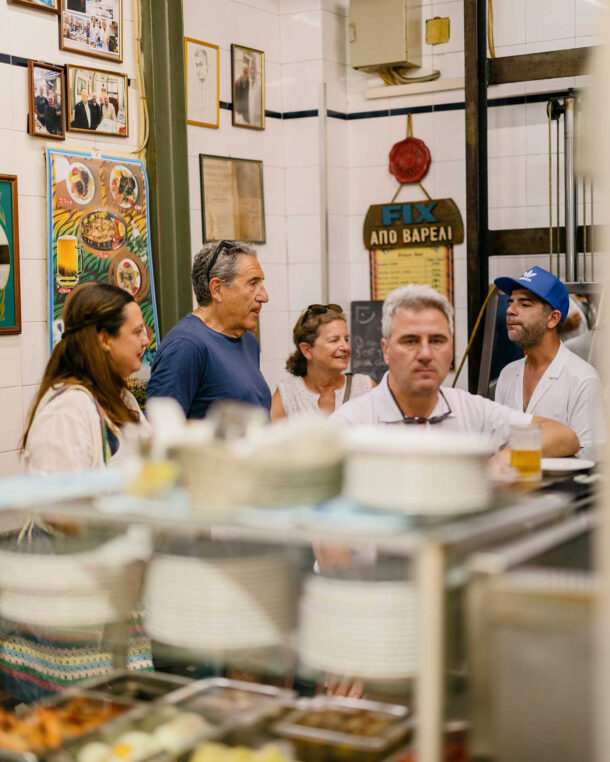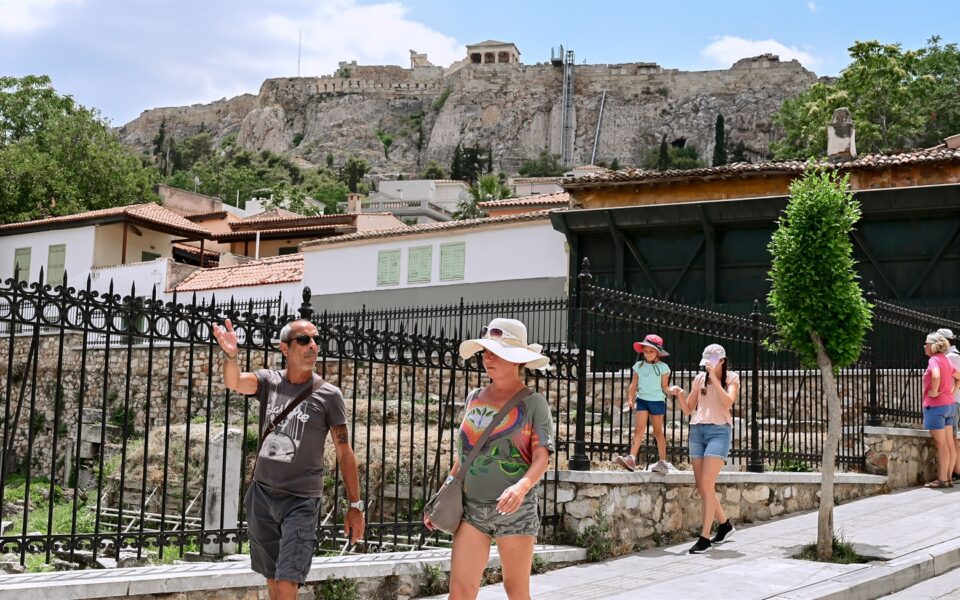Gastronomic tours: The delicious new trend for visitors to Athens

“Souvlaki. And baklava. And that round bread with sesame seeds. Koulouri! These are a few things I definitely want to try while I’m in Athens,” Grace says as we head from Syntagma Square toward Monastiraki early in the morning, trying with little success to avoid the heat.
“Souvlaki. And baklava. And that round bread with sesame seeds. Koulouri! These are a few things I definitely want to try while I’m in Athens,” Grace says as we head from Syntagma Square toward Monastiraki early in the morning, trying with little success to avoid the heat. In her early 20s, Grace has just completed a course in pastry studies and, along with her brother and parents, has come from Canada for a vacation: first Athens, then the islands. During the few days they will spend in the capital, they have planned to visit the Acropolis. However, before ascending the Sacred Rock, they decided to join one of the many food tours now available in the city.
Exarchia: Taste of utopia
Searching online, one will find dozens of gastronomic tours advertised. “Eat Like an Athenian,” “Gastronomic Secrets of the Center,” “Exarchia: Taste of Utopia,” “Tasting Athens’ Food and Wine” and “Midnight Gastronomic Tour” are just a few of the titles that appear. Some seem more casual, while others are more curated and insightful. The tour I am joining, along with 10 visitors from Canada, the UK and Mexico, is organized by Alternative Athens, a Greek company that started operating in 2013 and, according to its website, aims to present travelers with “the authentic side of Greece, beyond the easy tourist stereotypes.”
“For the next three and a half hours, we will talk about the history, food and landmarks of the city, walk around, and, of course, eat,” says Antigone, our guide, outlining a route from Syntagma Square to the edges of Plaka, the Psyrri neighborhood, Theater Square and Monastiraki. Stops include sand-brewed Greek coffee, olive oil tasting, souvlaki with red spicy sauce from Kostas at Agia Irini and a meal at the time-honored taverna Klimataria. The conversation flows easily, covering topics from the meaning of the “extra-virgin” olive oil label to the climate crisis and its impact on domestic production, Greek-Turkish relations and social structure, and then back to giant beans and graviera cheese. “Food helps you understand people too,” says Peter from London, who works in cultural heritage and is participating in a gastronomic tour for the first time. “It’s a universal language, and if you think about it, it’s the only piece of culture that enters our bodies, that literally becomes part of us,” he continues.
Coffee and rose loukoumi
Konstantinos has been working with Culinary Backstreets, one of the world’s most successful gastronomic travel sites, active in 19 cities from Barcelona to Rio de Janeiro, Mexico City, Shanghai and Athens. In the Athenian food tours he leads, a maximum of seven people can participate each time, and they often last more than six hours.
Food ‘is a universal language, and if you think about it, it’s the only piece of culture that enters our bodies, that literally becomes part of us,’ says Peter from London
Along with the American couple who booked the tour, they have already stopped for bougatsa and then for coffee with soft rose loukoumi – Greek delight – at Mokka, the cafe-roastery that has been operating since the 1920s next to the Varvakios Market. When I meet them, they are sitting inside the market at a lesser-known spot, even to many locals: the ouzeri in the fish market hidden in an alley between two fish shops. A few slices of white bread, pickled peppers, melted cheese and the trademark mini lamb meatballs – that’s all the mezes served at the ouzeri to accompany the tsipouro made by the owner, Kostas, son of Giorgos Karagiannis, who started the business around 1970. Among the patrons – who know each other by first names and are mostly market vendors who have been up since dawn and come here for their lunch break – are Jeff and Gwen. Although Athens is familiar to them – Jeff spent two college years here, and he and Gwen visit Greece almost every year – they decided to join a food tour this year.
“Every morning, I make Greek coffee at home and study Modern Greek. In California, we visit Greek restaurants and often cook Greek food at home, but if we were exploring the city on our own, we would never have found this place,” Jeff says. “Now, whenever we go to a new place, I look for a food tour,” Gwen adds. “Even in the US, there are some [food tours] I would like to do. In New York, New Orleans… It’s an easy way to get to know the place you’re visiting. You explore parts of the city you wouldn’t as a tourist. For me, it also matters that you get to know a local who happens to know a lot about food,” she explains.
Walking through the market amid the meat, fish, voices and a brief argument near the butcher’s window with pig heads, Konstantinos delivers a crash course in food-related geography and anticipates questions from his group. In just a few steps, he covers the history of the market, the country’s mountainous landscape and its impact on meat preferences, immigrant communities in Athens and their culinary habits, the best types of fish, farm-to-table practices and more. “We’re not used to seeing animals like this. In the US, there aren’t many butchers left. You go to the supermarket and get a piece. Everything is packaged and ready. You rarely see something like this,” says Gwen, who, like me, is carefully navigating the melted water on the ground as we leave the market.
Olive oil, honey, loukoumi
Next is Omonia: Ktistakis’ loukoumi, Stani’s yogurt and Lefteris O Politis’ souvlaki. “It’s a bit of a rougher part of the city, but there are gems here – small businesses that need our support,” Konstantinos says, giving a brief introduction before we start walking on Socratous Street, which, despite the heat, is lively at this time. “Visitors want to try the city’s real food,” he tells me. “Over the years, I’ve seen people become more and more interested in Greek food. They now understand that Greek cuisine is not just ‘opa cheese,’ the pan-seared saganaki served at Greek restaurants abroad while playing ‘Zorba the Greek’ and breaking plates.”
“For many, the healthy aspect of our diet is appealing. They are genuinely interested and ask me about yogurt and olive oil. Some even cook exclusively with olive oil at home. Vegetarians and vegans are thrilled; eating gemista and fava, they don’t feel like they’ve missed anything at the end of the day. What impresses them the most is what I like to call ‘the luxury of simplicity’ – the idea that a dish with five to six ingredients can be so delicious. And the fact that food that might be familiar to them and they’ve tried elsewhere tastes completely different here,” he explains. At the modest and cool loukoumi shop of Ktistakis, we sit and enjoy a sugar boost as the sun reaches its peak. Gwen orders a package to take home, which will travel back to California with the olive oil, honey and oregano she has purchased.

This article first appeared in Kathimerini’s Sunday magazine K.




